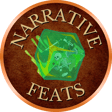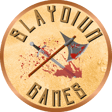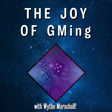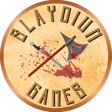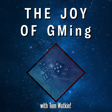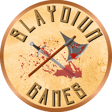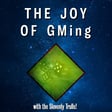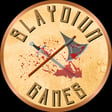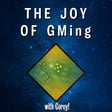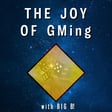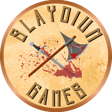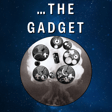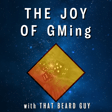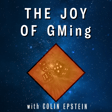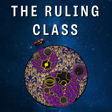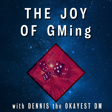Introduction to 'The Joy of GMing'
00:00:34
Speaker
Whether you're at a gaming table, in your comfiest chair reading a book, or listening at home, there's nothing like a great adventure story. But they don't happen by accident. Welcome to the Joy of GMing, a special interview series on the craft of great gaming.
00:00:51
Speaker
There's just something magic about sitting down to a good table with great friends, isn't there? If you're a lifelong gamer or a newbie rolling up your first character sheet, if you're a DM or GM or just can't get enough tabletop talk in your day, this is the show for you.
00:01:09
Speaker
Each episode will bring you amazing guest speakers to talk about writing games and running them, building fantastic worlds and compelling story arcs, and oh-so-useful tricks of the trade.
00:01:21
Speaker
Hear some amazing stories, get inspired for your next game, and join us for an hour and a half or so of lively conversation.
Casey Jones on Writing and Producing
00:01:29
Speaker
This sister series to Narrative Feats, the tabletop anthology, will be released between episodes of our ongoing serialized show.
00:01:36
Speaker
We cover some making of and behind the scenes tidbits of our latest mod as well. So do stick around. I'm Casey Jones. Over the last dozen years, I've written and produced screenplays, children's animation for TV and film, graphic novels, stage plays, murder mysteries, and award-winning audio adventures.
00:01:54
Speaker
I've also been writing and running tabletop games for over 10 years. Join us as we dive deep into tabletop with experts in the field.
Meet Sam Dunewald
00:02:03
Speaker
Experts like our special guest today, Sam Dunewald.
00:02:06
Speaker
Sam is an award-winning filmmaker, podcaster, and tabletop designer best known in games for the Dice Exploder podcast, a design show that breaks down one game mechanic each week.
00:02:19
Speaker
His games include Space Train, Space Heist, the Blades in the Dark supplement Doskfall Breeds, and the Golden Cobra winning game, the Hents Union LARP. Sam was a judge for the 2022 THE awards, and he has no colon.
00:02:34
Speaker
Sam, welcome to the show. Thank you so much for having me. have Have you had a guest before sort of convey to the listener just how endearing your dance is that you do along with the opening music? Because I think people need to know if they're dancing at home that you're dancing along with them. It's really lovely.
00:02:52
Speaker
I'm thrilled. Well, yeah, we like to kick things off with a little something to get the blood going because this is a fun thing we're doing. Yeah. One of my all time favorite activities is getting people to open up by talking about stuff they love to talk about.
00:03:09
Speaker
That is the skeleton key to getting anyone to talk. Ask them what they like to talk about. Boom. That's conversation. Yeah, I have the same trick. And now so do our listeners. Sam, welcome to the show.
00:03:20
Speaker
Always nice to have another podcast host at the mic. Oh, yeah. It's great to be here. i'm I'm really happy that you're having me.
Origin of Dice Exploder Podcast
00:03:27
Speaker
So what can you tell our listeners about your show, the Dice Exploder podcast?
00:03:32
Speaker
Yeah, so I started this about a year ago. We're recording this in February of 2024. So I started in like February 2023. I was hanging out a lot in the the Blades in the Dark Discord where i've been for a long time.
00:03:44
Speaker
And they had sort of a podcast that was running sporadically where they would interview people about their games. I co-hosted some of those episodes. I appeared on as a guest a couple of times.
00:03:56
Speaker
um And I listen also to like a lot of interview shows, ah like designer interview shows, kind of like this one, but specifically for... designers like breaking down their own games.
00:04:07
Speaker
And i love a lot of those shows, but I found that the conversations I was hearing tended to be a lot more about cynically speaking, they were partly about marketing, right? People would have new games out and like go on these shows, but they also, i don't think anyone was really in it for the cynical part. Like I, people were just kind of talking about their stories and what inspires them and like going through the thing and that's great and that's wonderful.
00:04:32
Speaker
But I didn't really see anyone in the world like talking about analysis of existing games of and like really going into the nitty gritty, like deep dive production stuff. Like one of my favorite podcasts is Song Exploder. I love Song Exploder, which is this show where they bring on a musician, break down one song beat by beat and then talk about putting it back together. So they they'll like play all the individual stems of the track and you can see how everything came to be.
00:05:02
Speaker
And i've wanted ah process show like that for RPGs. i felt like that was something that was really missing in my diet. I used to love this show called The Hard Move, which was just taking a single powered by the apocalypse game move, like one mechanic every week and breaking it down like as far as they could.
00:05:22
Speaker
And basically I just wanted to make that show, but for mechanics at large. And so then
Deep-Dive into Game Mechanics
00:05:28
Speaker
I did. And so I was talking to a friend about how this was basically me ripping off Song Exploder and they were like Dice Exploder would be a good name.
00:05:35
Speaker
Here we are. as We've got the show all wrapped up. And then he did all the graphic design for me, which came out beautifully. And like six months later, I was putting about on putting out a bunch of episodes. So i I feel like we've done a really great job on the show of...
00:05:50
Speaker
having these really deep, specific specific conversations, not the sort of broad conversations of like where do, how did the game get started? I think all those are good, but those are well covered.
00:06:01
Speaker
I really enjoy these conversations that are, how is this very incredibly specific part of the game functioning? How is it sort of affecting the whole game and affecting the table? And what can we learn from that one thing?
00:06:16
Speaker
Yeah. yeah Yeah. No, there's, there's something that can be very rewarding when you break down a specific plot device or character trope or setting as character, yeah like, and just go over it facet by facet. Um, music analysis is not something that I spend a ton of time with, but I absolutely love it when
Creative Process: Examples in Game and Music
00:06:41
Speaker
Yeah. There was a video on YouTube floating around that analyzes the musical battle of Doctor Strange and the Something of Madness. Like breaks down all the musical choices and why they resonate, haha, and make sense for this. But the other one I really loved was the analysis of the Die Hard soundtrack.
00:07:02
Speaker
Oh, yeah. And ah like the unequivocal breakdown of why it is a Christmas movie is like comes down to all the music they use and the themes they bring in, especially when Alan Rickman is on the screen.
00:07:15
Speaker
And it's it's it's wonderful stuff to track down. Yeah, I also find you're talking about it there with musical score kind of thing. i love the conversations about really specific examples.
00:07:30
Speaker
I find them much more practical and sort of useful as an artist to me and a creative and as someone who's just sort of interested in learning about how games or movies or whatever work. It's just, I think I see a lot of conversations that sort of involve people getting up their own ass theory wise. And I really love crawling up my own ass like theory wise and like making a weird taxonomy or whatever. like talking about like really abstract stuff. What does really all mean? We've gone abstract all right.
00:07:57
Speaker
Yeah, but like listen, I will play there all day. It's it's fun. But i I think I personally find it a lot more educational to to work with really specific examples like the score when Alan Rickman comes on screen as opposed to what makes good movie music at large. That's a very, it's so broad, it's hard to have a conversation about.
00:08:20
Speaker
Well, what you're talking about is a cornerstone of good how-to, how good education, because of the four quadrants, the why, the what, the how, or the what if, the what if, what does it look like if I do it right?
00:08:34
Speaker
Yeah. This is the aspect. And in addition to game design, like of the God knows how many how to write a so and so books I've devoured over the years, like they use specific examples of here is this technique used well. Here is this device from this thriller that puts ice in your veins, you know, and then gives you the example. So, yeah, absolutely. That that can be really invaluable.
Designing Space Train Space Heist
00:09:01
Speaker
I would love to hear more about Space Train, Space Heist, because I absolutely love a sci-fi adventure, so please tell our listeners about Space Train.
00:09:12
Speaker
So Space Train, Space Heist is a single game. Okay, I was like 5% suspicious of like, is this just one title? Yeah, you know, you just gotta get space in there twice, ah because it's a cool word.
00:09:24
Speaker
How else will ah they know of takes place in space if you don't mention it twice?
00:09:29
Speaker
Yeah, I made this game in spring of 2020. There was some other stuff going on in my life at the time, and I just wanted some like fun, relaxing, like time. I specifically had been going to conventions. The other stuff going on in my life was the COVID-19 pandemic in case this. yeah clear I had been going to conventions a good amount in the years like prior to this, and I'd gotten really excited about the games on demand community at Big Bad Con and Gen Con in particular, where essentially you show up just at a three point in time, and then there's a bunch of games being offered and you sign up,
00:10:08
Speaker
for whatever looks interesting and then play with strangers or maybe you came with some friends you all sign up for the same thing but it's a it's a system of playing games at cons where you don't have to have anything planned ahead of time and also or you don't have to sign up for anything ahead of time and also you don't have to scrounge players to play with you like you can just show up and they do all that organizing for you So i loved Games on Demand. I wanted to run Games games on Demand. And I was obsessed with Blades in the Dark at the time, very excited about Blades in the Dark.
00:10:36
Speaker
And my experience was that Blades in the Dark made for a very poor convention game. It's a game that thrives really in campaign play, I think. There's sort of this core loop of you go on a score, you do a heist, like an action sequence, and then you come home and you deal with downtime and your dying mother and like the other rival gang that is like coming at you for the heist you did four heists ago and the cops finding and all this kind of stuff that is just sort gradually building.
00:11:10
Speaker
And i felt like the rules of Blades in the Dark, as much as I was obsessed with them, really were a lot more complicated than you needed to teach in a like four hour one shot. There was just so much extra baggage that was never going to come up there that fed that longer term thing and learning all of it was never going to pay off unless you were doing the longer term thing.
00:11:30
Speaker
So I wanted to create a game designed to give me the fun heisty experience that Blades was giving me without all the extra baggage. And I decided it would be fun to do that in almost, do you remember Salty Bet? Salty Bet was this thing on Twitch. It was like an early, it was in like 2010.
00:11:52
Speaker
was an automated thing, kind of Twitch plays Pokemon-y, where essentially someone had hacked like a Street Fighter console to create randomly generated characters, come onto screen and it would be like Batman, but he's a fox,
00:12:07
Speaker
fighting against like Sonic and Tails fused together. or so It was weird and preposterous. And then chat would bet on who would win in the fight. And then it was like procedurally like just a fight back and forth and you could like win currency.
00:12:22
Speaker
but the the sort of vibe of it was this marvel versus capcom like pop culture mashup you could throw anything in there and we are just going to be like loud and in your face and allow for whatever silliness you wanted as a player at all times And I thought that that was a very fun, bright experience and vibe that I wanted to both bring to the average con table. I think, you know, I played great games, of very serious games at cons, but also think a lot of people are kind of showing up to beer and pretzels game it.
00:12:56
Speaker
I just took all of those instincts together of let's do something bright and fun, because that'll be good for the convention. Let's make it fit in the the one shot. And also, Like, I want everything built up because it's freaking locked down, you know? Like, I just wanted to have a good time.
Gameplay Dynamics: Space Train Space Heist
00:13:12
Speaker
So the title Space Train Space Heist appeared in my mind, and the rest of the game basically wrote itself, you know? i i i then did...
00:13:22
Speaker
a bunch of fun stuff around taking the individual more complicated pieces of blades in the dark and just assigning them to one playbook at a time one class at a time and so a lot of the the more complicated mechanics i still got to keep but i also simplified things at large by just only giving them to one person so if you're excited about that one mechanic you can have that be the thing that you're learning for the next two hours and then you don't have to worry about everything else And I play tested it a bunch and had a blast.
00:13:51
Speaker
That year, there were also a bunch of bundles of indie games on itch. And it made its way into a couple of those and kind of popped off at one point. So a lot of people have downloaded it. Take a look at it. I'm very proud of it.
00:14:04
Speaker
That's wonderful. Yeah. You've mentioned something twice, which I think is central to the creative spirit. ah This idea of, well, there wasn't a thing in this particular niche.
00:14:17
Speaker
Yeah. There wasn't a show that was analyzing a single ingredient of game, and there wasn't a heist game that didn't require hours and hours of backstory and things to set up.
00:14:30
Speaker
and you targeted those, you asked yourself, what would this feel like, smell like, taste like to be satisfying? And then you went and answered those questions with a lot of research practice and test play from the sound of it.
00:14:45
Speaker
Yeah. Wonderful. Yeah. wonderful I think um It's interesting, you talk about that like, like that's my strategy for making things. And I think that that that actually is a good strategy for making things, but I feel like I run much more on instinct with it. That and it was sort of like, oh, I've identified this hole and i'm I'm just gonna solve that problem real quick. Like, I'm not thinking about it as something that I'm going out there and doing, it's just before I know it,
00:15:13
Speaker
oh no, like this has become my life. This is the thing that doing right now. Like I know i have to ah have to keep going with this because i must finish the projects now. But it it really starts off from, i want this I want this thing in my life, not a, what's my next creative project going to be?
00:15:32
Speaker
Yeah. You seldom go looking for those. They yeah pop up and say, I'm high. I'm the center of your life now. Yeah. Yeah. those will Those will grab you. And if you're not careful, clutch you for years. That's what it was like with my first graphic novel.
00:15:49
Speaker
It took years to get the artwork paid for and the scripts polished and everything and then to actually have the thing produced. But... So walk us through a brand new mod of Space Train Space Heist. You son of a bitch, I'm in.
00:16:03
Speaker
Yeah. How does a per, like what what does a PC do to get assigned a spot on one of these heists? Yeah, you show up to the table. It's a game without a GM. It's GM-less. And yeah, so you all just, someone can be a GM if they want to. And I have sort of separate rules for that. But broadly speaking, you just sort of show up And whoever shows up to the table, these are the sons of bitches who are in.
00:16:28
Speaker
These are people who have already said that. And there's a number of playbooks. The playbooks are things like the Gadgeteer, I believe is one of them. That one got renamed at one point, so I might be using the old name.
00:16:41
Speaker
But that's the person who's got all the like gadgets and the gear and the stuff that they're gonna go out there and do stuff. with And then there's the con artiste, who's like your socialite, who's your person who's gonna be lying to people. The face.
00:16:54
Speaker
Exactly, scamming their way through. And then you've got a space wizard, because you know, we're space train space heist. We've got a space cowboy, because that sounded like a fun thing to make a playbook for. There's a couple other ones too.
00:17:06
Speaker
So you show up, you and pick your playbooks, and then you go around the circle and there's some rules for both customizing your particular space wizard and what you're all about. You know, you might be better at ah train-based magic, or you might be better at black hole-based magic or fireballs. and It's up to you. There's a pick list.
00:17:24
Speaker
And then you go around and establish your relationships with the rest of the crew. how do you know each other? You know, are you like ex-lovers or are you old friends? Get a stitch together in space Alcatraz.
00:17:38
Speaker
Exactly. or are you ex-bandmates? You that's one of the wizard ones, I think. And you know, you kind of tell a tale from there of how you all came together. And then there's some random tables or you can just decide for yourself, like, what are we stealing today from the space train? What are we on this train in space?
00:17:56
Speaker
ah Exactly. And then it's assumed that we sort of have already snuck onto the train and we start in media res in a train car and then Essentially, there's rules for rolling the dice and seeing what kinds of complications show up between you and your quarry.
00:18:13
Speaker
Naturally, you need complications. That's what the game is all about. There's a fun little the thing I'm proudest of in the game really is a ritual at the beginning of the game in praise of complications and getting yourself into trouble.
00:18:25
Speaker
And it's sort of a mantra that everyone says together. And yeah I think it does a good job of getting people in the mood. That's wonderful. Yeah, then you just kind of go through and you start rolling dice and having a blast.
00:18:38
Speaker
And if you get stuck, there's all kinds of random tables in the book to sort of help give you ideas, to sort of give you more juice, keep you going. And you go through three train cars like this, and then you're done. And hopefully it took you about two hours. I know some people it takes a little bit longer. I've played it in 80 minutes.
00:18:56
Speaker
It depends on the number of people you have, too. Sure. But it's it's just a fun lark of a game. i think it is it's not a game that is particularly serious. It's not a game where you have a lot of feelings necessarily. You just sort of goof around for a while with your buds and I'm a fan of that.
00:19:15
Speaker
Clearly that sounds like a ton of fun. Curiosity begs the question, what are some of the complications?
Fun Complications in Heist Games
00:19:22
Speaker
What are some of the wrinkles that can come up in a given heist?
00:19:26
Speaker
Oh, I think the one that i put at the top of the list is Something's on Fire. i mean, that's just like a tried and true classic, right? But let me open up. I think it's it's more about compelling consequences most often come from like the locations.
00:19:46
Speaker
The things I have random tables for in the the game are reasons you're heisting, people you might run into. Every character also has a friend and an ally, like from their past that they might know.
00:20:00
Speaker
um And then what are you trying to steal? And that can come with its own obvious sort of set of problems, right? If you're trying to steal the last living Zozo bird, who's highly allergic to humans, we already have several problems baked into that. Like it's allergic, and also maybe it's out of its cage, and it's doing just fine flying around the car here.
00:20:22
Speaker
Who knows what's going on exactly with that? And meanwhile, you know, we've set up... ah Oh, the last table is train car contents. So if the Zozo bird happens to be in the middle of an in progress foosball tournament.
00:20:39
Speaker
The perfect cover. Again, like foosballs are flying everywhere, right? Maybe the foosballs look like the Zozo bird eggs and now we have a problem. Like it's sort of the consequences I think come from, all right, I throw you some silly environments. I throw you some silly characters and you can kind of have fun mashing those together into whatever consequences make sense for you.
00:21:00
Speaker
Yeah. That sounds amazing. Thank you for sharing those details.
Influence of Blades in the Dark
00:21:05
Speaker
I am not sure that all our listeners know a ton about Blades in the Dark. Can you tell us a but a bit about that?
00:21:11
Speaker
Yeah, so Blades in the Dark by John Harper, who's maybe more well known for Lasers and Feelings, is a small game that he made where you're doing Star Trek things and your two stats are Lasers and Feelings.
00:21:24
Speaker
But he went on to create Blades in the Dark, which is a steampunk with ghosts, Victorian city heist game. It is that pre-industrial, or early industrial revolution, let's say, kind of feeling. You're in a city, it's full of smog, there's factories everywhere, capitalism is very bad and oppressing all of you, and you are, shake your fist as you do, ah you are some sort of criminal gang in this city.
00:21:58
Speaker
doing your best to rise up through the city and make a name for yourselves. the In addition to each player character having a character sheet, your crew itself also gets a character sheet in the game. So yeah if you're a cult, then the cult as an organization has a crew sheet. And if you are Hawkers, when you're selling drugs or whatever, maybe you're selling ghosts, so who knows, the Hawkers crew has a sheet of its own.
00:22:28
Speaker
And the last piece of the setting is that this used to be a thousand years ago, a sort of traditional Dungeons and Dragons fantasy world. But then some ding-dongs opened the gates of death and now there's ghosts everywhere. And if you go outside the cities, there's a bunch of ghosts and they'll eat you and you'll die.
00:22:47
Speaker
And the cities have all built giant electric fences around themselves to keep the ghosts out that are powered by demon blood. Yeah. And so like many people have to go out on the whaling ships to harvest demon blood from the Leviathans that live in the ocean and then bring that demon blood home and process it to run the lightning barriers that keep out all of the ghosts.
00:23:09
Speaker
And none of that is actually particularly relevant to you as players. That's just sort of background noise to let's be let's do the wire. let's try to do our best to like come up through this city it's just an excuse for you to be unable to leave the city when you inevitably get in a ton of trouble with the cops and a ton yeah sure with your rival kings uh yeah my experience with the game is that things go horribly wrong for everyone all the time basically immediately and uh it's a delight as that happens
00:23:40
Speaker
That does sound delightful. So what about your supplement, Duskful Breeds? How does that take advantage of Blades in the Dark? Yeah, so Blades in the Dark, as I mentioned earlier, is this game where the format is you'll go out and you'll do a heist, you'll do a score of some kind.
00:23:59
Speaker
and then you'll come home and you'll have a downtime phase. And some people play that downtime phase very much like a board game almost. You're sort of recharging, you just roll a few dice, you work on your long-term project to invent a flamethrower, you go and talk to the cops and pay them some money so that they'll stay off your back for another week, and then we're back into the next heist.
00:24:21
Speaker
And i really love playing games that dive really deep into character and character interactions. I think that as much as I literally just spent 15 minutes talking about my game that is completely not about that, that is only about sort of weird gonzo heisting stuff, that is really my favorite part of role-playing games.
Enhancing Blades in the Dark with Duskfall Breeds
00:24:43
Speaker
I think Blades in the Dark has the potential to take those downtime actions, the the part of the game where you're just kind of doing bookkeeping and turn them into character scenes.
00:24:56
Speaker
And a lot of people, a lot of people that I play with especially, naturally did that. That it's not just, I'm gonna go like mark two coin on my sheet that I have paid to the cops. It's that I'm gonna go do 45 minute scene in which I talk to my cop friend Detective Barnes, and we're going to dive into our tenuous relationship and what Barnes is dealing with at the precinct and what alley we meet in and what we have to say to each other. And every time I'm afraid that he's going to arrest me and every time he's afraid that I'm going to kill him.
00:25:29
Speaker
And we just have this weird, tense relationship. That stuff's so juicy to me. So yeah i created this supplement. Duskwall, incidentally, is the name of the city that you're in in Blades in the Dark.
00:25:44
Speaker
Or Duskwall. It's either way. so Oh, apologies. Duskwall. No, no. They use two different words for it in the book. So I i like Duskwall because it sounds Russian and fun. and dust well is what most people say because they're not weird like me but i made this supplement that is just okay what if we took that downtime system and instead of having the action be reduce heat is the name of the sort of bribe the cops kind of action you have heat you're basically like grand theft auto stars that slowly build up but ah for your crew and reducing heat is bringing them back down
00:26:18
Speaker
I created the supplement that is about, okay, let's keep all the action, the heist rules the same, and let's keep some of the downtime stuff the same. I don't wanna blow up the whole game because it's, I like the game. I like so much about the game, but let's bring in some more basically lists of character questions, like provocative questions. If you're going to go to the doctor, because you got beat to hell in the last score that you did, what's that doctor like? Let's talk about her name. Let's listen to what she has to say, see where she lives.
00:26:51
Speaker
One of the like, downtime actions you can take is doctor's orders is the name of it. So it's all about that instead of just marking two coin on your sheet. I kind of pumped this thing out in like an afternoon one day as sort of a thought experiment, but it was pretty influential. Like Blades in the Dark is a game that a lot of people have hacked, have made their own version of like Space Train, Space Heist. But you know, there's a Star Wars version. There's a grim dark military fantasy version called Band of Blades. But those games made by, oh gosh, well, Strosch and a couple other people.
00:27:27
Speaker
But, um Slug Blaster, incredible Blades in the Dark hack about being teenage skateboarders doing alternate dimension multiverse. Radical! Yeah, fun.
00:27:38
Speaker
Kick flip over a quantum centipede is the tagline. So all these people are making all these different versions of Blades in the Dark. And I think This particular supplement was very influential for a lot of those people. Like you started to see after I kind of put it out in the world, a lot of these people were trying different things out with their downtime systems. And I'm really proud of that. I'm i'm proud that, ah you know, i made i made it I made a thing that a lot of people thought was mechanically very interesting.
Hench Union LARP and Its Origins
00:28:08
Speaker
What can you tell us about your game, the Hench Union LARP? I would love to hear about that. Yeah. So ah we got to start by talking about the Golden Cobra challenge.
00:28:19
Speaker
Okay. So the Golden Cobra challenge is... Yeah, exactly. They've got a Twitter account and every time that they tweet, all the, well, they probably closed the Twitter account by this point, honestly, but every time they would tweet, they would take any word that ends in an S and just string out the S because they're a bunch of golden cobras.
00:28:39
Speaker
But it's a game jam and award ceremony for LARPs. So live action role-playing games. Yes. Which... is a wonderful, wonderful kind of role-playing game, in my opinion. Arguably not even a role-playing game. That's where we started. LARP is maybe different from RPGs.
00:28:57
Speaker
But it's not just this sort of buffer, like, let's run into the woods and shout magic missile at each other and hit each other with sticks thing. Actual role-play LARP, yeah. Yeah, like my introduction to LARP was pretending to be androids who were slowly having our memories erased. It's called factory reset. So you're you're just like a bunch of androids in the waiting room, waiting to go back into the the back room to be reset to factory settings. And it's very sad, very good. Based on real Star Wars canon. Okay, so.
00:29:31
Speaker
LARPing, it's great. ah If you want to cry about it, you can play that game. there There are other stuff that's... The classic murder mystery party is also basically great. Yeah, I love a good murder mystery party.
00:29:43
Speaker
Yeah, yeah. I could hear your bio earlier. um Yeah. So the Golden Cobra Challenge is basically a game jam for LARPs. It's like, we want more LARPs to exist in the world, particularly in the United States, where there are fewer LARPs than other places in the world.
00:30:00
Speaker
And we want people to just make more. So we're going to give out a bunch of awards. And every year, like in the fall, usually in September, they announce it, they'll be like, these are the ingredients for this year's golden cobra challenge like you might have to include god what were the requirements the year that i did it it had to be a committee larp so you had to all be a bunch of people sitting around arguing about stuff and having to make a decision together and i think you got bonus points if you were somehow involving minority religious experience
00:30:35
Speaker
So there was a very interesting game that year about visiting a Dwarven village and participating in their religious rituals.
00:30:47
Speaker
Very interesting. I chose not to do that. I basically just went with the committee LARP thing. Long ago, I've taken it off the internet so you cannot find it, but I made a web series called Evil Emma and it was sort of about, i pitched it as girls meets the boys. It's bunch of aspiring super villains like hanging out in apartments and being sad and like trying to get their start in this crazy industry. Right.
00:31:12
Speaker
And part of that vibe of superhero, that ground level, like who are the people working on the Death Star kind of feeling, who are the henchmen in the evil layer was something I've always been really interested in and excited by. I like losers in the context of greatness. I think that's very funny.
00:31:32
Speaker
I dig that. I dig that a lot. Yeah. And several years ago, I used to work for The Onion, America's Finest noon sort News Source. Hey! Yeah, as a video editor. And while I was there, we unionized. And it was an incredible thing to be a part of. i really think it's like the best thing I've done in my life. I really loved doing it.
00:31:50
Speaker
I learned a lot nations about thank you the process of unionizing in the process. Naturally, at some point, these the two things jam together in my head of like henchmen trying to unionize against a supervillain.
00:32:03
Speaker
Maybe there's a metaphor there about real life bosses. I'll let you try to see through the opaqueness there. But i I had this idea when I saw the the committee LARP thing to do this and just kind of smash those things together. So it's a really simple game, basically. You just, everyone gets a character and the characters are pretty simple.
00:32:26
Speaker
They have a couple of personality traits and they have some issue that they really care about. There's like maybe six issues total that everyone cares about. And so everyone's ranking them in a different way.
00:32:38
Speaker
You go in and there's like a boss side. So someone's playing Professor Von Doctor, the evil henchman. Exactly. Yeah. he He actually has a hook for a hand, so he can't do the clapping himself slow. Clank.
00:32:51
Speaker
Clank. Yeah. yeah of yeah And he's got a lawyer too. And the two of them are one side. That's even worse. They kind of sit over there and try to like argue their case.
00:33:03
Speaker
And everyone else is part of the union and is trying to argue their case. Come together and you meet, then you go back and talk amongst yourselves and you just go through the unionizing process. Basically, I thought it would be a fun way to trick people into pretending to unionize and learning about how unionizing works.
00:33:17
Speaker
That's brilliant. Yeah, people have really liked it. ah And it it won best decision-making mechanic that wasn't just majority rule, I believe. Okay. The way it worked is at any time, Professor Von Docter can just...
00:33:35
Speaker
detonate doomsday device. That name is is just poetry. So you can just destroy the world rather than continuing to negotiate if he wants to. And the union side also has stolen a doomsday device. So they also can just detonate and destroy the world at any time if they want to. And like this to me, it was the sort of metaphors for firing everyone or going on strike.
00:33:58
Speaker
Because going on strike is, yeah i'm I'm trying to break into Hollywood. We were just on strike a whole bunch last year. it was very effective. I'm very excited about striking, but it was also really horrible. Like it it really hurts everyone. It's a mutually assured destruction kind of thing.
00:34:14
Speaker
I wanted to convey that. So, yeah, so the voting mechanics are interesting. It's sort of, it's gradually you need fewer and fewer votes on the the union side to decide, fuck, screw it. Let's just like blow up the world now.
00:34:30
Speaker
And... and We don't think our demands are unreasonable. Those of us that work in the acid pits just want acid proofing on a jumpsuit. Yeah, I think one of the characters particularly was the guy who feeds the piranhas in the piranha tanks.
00:34:46
Speaker
and Thank you! Exactly, and his whole thing was they don't get fed enough. They're hungry all the time. We gotta take better care of the piranha and no one else cares about the piranha and that was my favorite guy to play. was Just be cranky about his his loan issue.
00:35:01
Speaker
That's just marvelous. That's just flipping marvelous. Yeah. Okay, let's talk game design. As the creative mind behind such award-winning games as the Hench Union LARP, where do you begin once an idea has struck
Intuitive Game Design Approach
00:35:20
Speaker
Yeah, I mean, I think it's different for every idea. i think, you know, um' as I said when I was talking about my podcast, I'm a man who loves specific examples.
00:35:31
Speaker
And I think I've just described three different examples of three different ways that the game idea really like came to me in the first place, whether that was taking an existing game and seeing the way I wanted to change one part of it, or whether it was responding to prompts for this challenge and pulling together a couple of different pieces of my life, or whether it was wanting to make a game for a very specific purpose of running fun adventure for strangers at a convention.
00:36:01
Speaker
All of those things are very different starting points, but they also provide ah very clear framework at large. There's a very clear goal for each of those things immediately.
00:36:12
Speaker
And i think once you have a goal, it's really easy to just get started attacking that goal or trying to approach it, trying to work on it. I don't really have creative projects that I spend time thinking about that don't have a goal.
00:36:29
Speaker
Like I have an idea for a play right now that has one very specific creative feature or scene that happens in it and no story.
00:36:39
Speaker
And there's no way for me to like work on the thing, because there's no story. There's just sort of like an exciting technical thing that I want to do on stage. You want justify, yeah. Exactly. And so I have like a dozen, two dozen things like that, where I'm just not working on the project.
00:36:55
Speaker
It's just like ah an idea that lives in a Google sheet somewhere for me. It lives on a Trello board. I have all these pieces of ideas that just live in a Google sheet or whatever.
00:37:07
Speaker
And eventually I find that two of them click together or I find a way to riff on one of them. They all just kind of live back there and rest.
00:37:17
Speaker
While I also have three or four or five or six or a dozen, way too many for sure at any given time, projects where, oh, the clicking has happened and now I just need to find time to start rolling the mold. To the legwork, yeah.
00:37:31
Speaker
I just don't start working on the thing until that goal, that end point, like the the way to get from here to there is clear. Like if the work's not clear, I don't, do what work is there to do? I don't do the work.
00:37:46
Speaker
um But I also, i i have a lot of ideas and I trust that I'm never gonna run out of ideas. I think everyone has a bottomless well of ideas if you just trust yourself.
00:38:00
Speaker
What I love about the creative process and the discovery of ideas is that like months, weeks, days, minutes before the idea clicks into place, the DNA of the various threads have been pinging in the ether around your head.
00:38:21
Speaker
details that may have gone unnoticed a line from a show you're watching or listening to ah craving for something you haven't had narratively speaking in a while and presto change oh you've got the idea for a show or a game or a short story or a fourth thing you're not quite off to the races but you're you're like oh a race would not be bad where are we gonna put that darn race Yeah, I think that just percolating is a hugely important part of at least my creative process and think many people's creative process.
00:38:54
Speaker
You know, I've struggled with anxiety a lot in my life, but particularly about, am I working hard enough? I'm doing massive air quotes with my fingers right now. Am I producing enough in the world? Am I spending enough time like putting my nose to the grindstone and actually sitting down and working?
00:39:11
Speaker
And I've been really trying the past couple of years in particular to listen to my therapist and my partner and not do that give myself- Therapy is awesome. Exactly. And to do- to give myself the grace and the understanding that a huge part of the creative process is just giving your brain weeks, days and hours and also years to just pour those ideas over, to sleep on them, to think on them and to wait for them to start drawing a blue.
00:39:41
Speaker
yeah And yeah, I think that's a really undervalued part of the creative process at large. Yeah, it's This is something i do. i can't speak for others, but I keep at least one folder handy of idea fodder.
00:39:58
Speaker
um I like little random bits of trivia. I like little strange facts um like a in a During World War II, a fighter pilot jumped out of his plane and shot down another plane from his parachute with his pistol.
00:40:19
Speaker
That's a thing that actually happened. And there's a story there. well Give it to the ether, give it to the universe. Someone give it up. I love little trivia like that or facts or tidbits because I'll make a note.
00:40:30
Speaker
or I'll put it in a folder and someday down the road I'll be writing a mod or a short story or a script or something and like, oh yeah, there was that thing.
00:40:43
Speaker
What if like a dragon rider got knocked off their beast and halfway down cast a fireball at another dragon rider and just ganked them? Ideas beget ideas, creativity begets creativity.
00:40:55
Speaker
Yeah, just that that being a hoarder of whatever little things excite you is an important part of the being a creative, I think.
00:41:08
Speaker
It is. And in addition to hoarding of like idea fodder, I personally also love hoarding worksheets because anytime I pick up a new medium to work in, the first thing I do is find credible, actionable how-to guides.
Tools and Frameworks in Creativity
00:41:25
Speaker
Yeah, totally. And from those, I start creating worksheets of breaking down the genre into steps and ingredients I'm going to need and scene cards to make sure it all clicks into place.
00:41:40
Speaker
And what I've actually discovered most recently, because I just started yeah working with a new worksheet for for tabletop games of like, here are the scenes that need to happen. Here the characters that are involved. Here's the fight we want to have.
00:41:55
Speaker
And the rest is unstructured. yeah But at the same time, like I've been recently ah sharing scene cards with a new friend of mine who's working on a pilot And I'm like, okay, here's the breakdown of like, this is what happens. This is what it means. This is the intrigue of the scene. This is the this is the tension of the scene. This is what leads into the next and blah, blah, blah.
00:42:14
Speaker
And those steps, those pieces go in a certain order with the certain pieces in play, like the characters you mentioned, to facilitate making it easier for you to do the next time.
00:42:29
Speaker
This is not mountain climbing. um Like if I can figure it out once and break it down into actionable steps, then you better believe I'm going copy and duplicate a blank form of that worksheet so I can just pick up a blank fresh one the next time I'm sitting down to do something like that and go to town.
00:42:50
Speaker
Yeah. you know? Yeah. That makes me think also about like I'm a screenwriter also in addition to a game designer and There are so many books out there in the world that are like, here's the formula for writing a movie. Here's how you write a story. Here's how all this works. And many of them have overlapping similarities, but largely speaking, they're all really different.
00:43:14
Speaker
And not all of them are right. And also basically all of them are acclaimed by someone as like their favorite text for how to do this. And i read a lot of them at one point and realized that I personally got a lot of different things out of each one of them and that the way my process was going to work was by taking different pieces from each one of them, right?
00:43:39
Speaker
I think at Pixar they have this Maxim that's like, tools, not rules. And I think that's super, super helpful that some I've just sort of collected again, like a hoarder, different ways of structuring a story.
00:43:55
Speaker
And so when I'm writing, I can go in and pick a different model based on what I think fits the story at hand. Or if I'm having trouble, maybe I'll throw out the current model that I'm using and bring in a different model and be like, okay, how can i rearrange stuff here to fit this new model? And does that make things feel better?
00:44:12
Speaker
I think game design is very similar way. There's a lot less here's how you design a game stuff out there in the abstract, I think. But there are a lot of different, like most people when they design games are starting from hacking a game that they like already, whether it's Dungeons and Dragons or whether it's Apocalypse World or Blades in the Dark or whatever. And those as a bunch of different frameworks that you can sort of pull pieces from or go and look at for trying to figure out what's gonna fit your game, i think is a really useful thing to be able to do.
00:44:47
Speaker
Well, I think a big piece of creation at least in the early stages is imitation. yeah Because first you have to develop taste. First you have to recognize, oh, I like so-and-so and can understand that I like the following reasons about so-and-so, the following pieces of it.
00:45:06
Speaker
yeah might want to make something like that myself. you know You're not just spinning whole cloth out of absolutely nothing. You've recognized something you enjoy. you want more of that. and then you begin to elaborate.
00:45:20
Speaker
You go to the pantry and start looking through ingredients and at some point, hopefully early on, you you ask yourself, how can I make this mine? Yeah. How can I make this distinct?
00:45:32
Speaker
I also love to make the comparison to Fix It Fic. Like you you look at a game and you do the thing that I did with Blades in the Dark, right? Of like, oh, I love... parts of this, but they did this part wrong. That's okay.
00:45:45
Speaker
I'll just change it. I'll just go in there and make a little change and do my own little thing. And pretty soon you have your own game. And I think fan fiction is incredible and Fix It Fick in particular, it's just like a wonderful practice. And doing that on the game level is excellent. I mean, people are, there famous screenwriters who did that with their own movies of like, They get a movie made, the studio changes the ending, and it's really popular. They're like, I didn't like that ending. I'm going to make the same movie with a with the ending I wanted in the first place. Okay, cool. Like, great. but
00:46:20
Speaker
That's just a time-honored tradition and a great way of getting started playing art, as you said. They hadn't gotten it wrong the first time. I wouldn't have to go dig in and do it right myself. Blah, blah, blah. But if they hadn't gotten it wrong, you wouldn't get the joy of going in there and getting your hands dirty.
00:46:37
Speaker
The satisfaction. Exactly. Like for us, for anywhere but now, as an example, I absolutely love Doctor Who. I love most seasons of Doctor Who.
00:46:50
Speaker
The character is an expert and an adventurer and really doesn't need to learn anything about a new species or new technology or what have you, because they're already an expert in everything, but their feelings.
00:47:04
Speaker
And that can be a lot of fun, But it it completely robs us of the joy of discovery, you know, unless you're playing the companion and everything is new to you, that's fine.
00:47:17
Speaker
um But so for anywhere but now, the fix we did was like, okay, well, what if it's a relatively new Time Lord or Time Lady? What if they're very young? What if this is their first time with the training wheels off their TARDIS?
00:47:30
Speaker
How does that go for them? And over the first season, we've we've thrown a new young, like sophomore year, of ah junior year Time Lord against Time Lordy stuff.
00:47:49
Speaker
of like, okay, you're going to be someplace where something important is about to happen. ah Don't mess it up. Go. Okay, you've blown up a planet. Here is how that's going to affect things down the road.
00:48:03
Speaker
And like all these different challenges at different places in time and space. Space, space, space, space. Granted, we haven't done a train, a space train yet. I'm saving that for season two Yeah, you should heist that idea right out from under me.
00:48:18
Speaker
ah There have sadly been trains on Doctor Who before, so I'm afraid you can't claim the entirety of the idea. That's fair. oh It's fine. um But it has been really damn satisfying to watch a young Time Lord face these things of like, what am I going to do? How am I going to fix this? Because I haven't done it a million times already.
00:48:41
Speaker
You know? yeah You mentioned in your questionnaire the the special place in your heart that playtesting has. Tell us about a good session of playtesting. What does a good session of playtesting feel like to you?
Playtesting in Game Design
00:48:56
Speaker
Yeah, so i'll I'll start by clarifying my position here a little bit, I guess, which is I think a lot of game designers out there, I spent a lot of time, if you can't tell, talking with other game designers. And I think a lot of people really love getting out there and just kind of throwing their game online and or not play testing it, I guess. Just sort of making their game and assuming it will play the way that they think it will and the way that it runs or the way that it plays in their minds and the way that it plays when they are at the helm facilitating the game.
00:49:30
Speaker
And I think it's the magic of role playing games at large is what happens when a game collides with a table and what how each individual table takes that game and makes it their own.
00:49:46
Speaker
And how you as a designer can't really prepare for that in any way other than just doing it a bunch of times. So there are really small games out there and games that are more interested in maybe making a political statement or just being something closer to a poem than fully playable game. And those games those games don't need play testing. That's totally fine. Just throw them out there. I love those things.
00:50:09
Speaker
But I think there are also a lot of games where just getting the thing to the table and seeing what happens is invaluable for learning about how to run a good game, how to design a good game, what this particular game is doing and so forth.
00:50:28
Speaker
So when I'm going into a session of play testing to actually get to your question, I'm really interested in coming in with a very clear goal. like one particular mechanic that I'm interested in looking at, or maybe my goal is i want to hand this over to everyone and see what happens if I'm not there to explain everything. Or maybe it's just oh, I wanna test this one mechanic, but it's not until the very end of the campaign. It only comes to into play there. So we're gonna like pretend to play a whole campaign in 90 minutes and then we're gonna do that mechanic. Like whatever the thing is, just being very clear about what you want out of the the session, I think is really important. And then trying to just,
00:51:12
Speaker
have an open mind about understanding that players are generally in the right. Like it's, you can't fight human nature. i think a lot of people want to go into play tests also like, oh, this is how it's supposed to work. And now I hand you my like perfect system and you do the thing the way I want you to. And if everyone is coming up against the same problem over and over in your game, you gotta be able to listen to that and take that. and see that for the suggestion and feedback and advice that it is, as opposed to banging in your head against trying to make the same thing work.
00:51:47
Speaker
So I think that like, flexible like ah having a goal, being really flexible and open, and then the other piece of receiving feedback, and I think play testing is basically just feedback in real time, and people will like give you explicit feedback at the end, but watching them play is the most useful feedback. i think The thing about feedback, I think it's a Neil Gaiman quote originally, is that when people tell you what's wrong, they're almost always correct. But when they tell you how to fix it, they're almost always wrong. yeah And that's just so true across media. So I love going into a playtest, having a goal, watching people play, taking careful notes, asking them what they think the problems are, what they thought was good and so forth. And then taking all that home and absorbing it. in yeah
00:52:33
Speaker
revising the game to be something completely different. And I think being really open to changing your game dramatically based ah based on playtesting is also a really important part of the process.
00:52:45
Speaker
Absolutely. Flexibility is crucial. Yeah. You said two very dangerous words, supposed to. exactly. This is how it's supposed to work.
00:52:57
Speaker
And i can tell you from experience that how we expect something is supposed to go or is supposed to land ah does not always actually match or even resemble what lands. Yeah.
00:53:13
Speaker
for people. um So being able to listen to what people are actually telling you instead of what you're expecting to hear ah is an invaluable skill to pick up.
00:53:25
Speaker
yeah You sound like you might have a specific example in mind, but I won't press it. Not game related, but murder mystery related. i wrote a full length cozy mystery and invented a small town that reminded me of Murder, She Wrote and a plucky protagonist and a sweet little cookie recipe and a murder that I thought was entertaining.
00:53:50
Speaker
and blah blah blah blah, blah, working through this thing. And I knew that there it wasn't quite there yet, that there were ingredients that hadn't quite clicked into place and sent it to an editor for their feedback. And some of it was very surprising.
00:54:05
Speaker
that can throw you for a little bit of a loop of like, oh, okay, that hadn't occurred to me. I never would have realized that and go with it, especially if it resonates with what it is that you want to create, because there is room, there is wiggle room between, well, i want this,
00:54:26
Speaker
versus well, people actually want that. Something in there reminds me also of how problematic symptoms in a creative work can be coming from really unexpected places.
00:54:39
Speaker
Like oftentimes, if people don't like the ending of your screenplay, it's because you messed up at the beginning, not the ending, or like you didn't foreshadow right stuff or what have you. And in game design, I think it can be the same way where like,
00:54:53
Speaker
oh, maybe people aren't liking the dice roll mechanic, but it's actually because of how your attributes work, not because of the dice roll or whatever the case may be. And that stuff can be very hard to find and very surprising to get feedback on.
00:55:09
Speaker
Yeah, absolutely. Like, if you're if you think that you've got X completely sewn up and just completely nailed, but you're looking forward to their feedback on why, because you're not really 100% on that, and like, no, Y's fine. What I what i have found issues with was X. That kid's surprise. Yeah. yeah So I did want to ask you about...
00:55:33
Speaker
The awards. The V awards. yeah And whether or not the colon thing was literal or just a joke. oh yeah yeah We don't judge either way.
00:55:43
Speaker
ah These are two very different topics. Which one do you want to... Fair. Let's start with the the awards. The V awards. So v Awards was a project started by Joe DeSimone, who's a guy that I knew from Twitter and a few years ago, and he was dissatisfied with the other RPG award ceremonies at the time and wanted to start his own. And he thought it would be he named them something with zero SEO because he's a monster and also named them ah in a way that
00:56:16
Speaker
rubs me a little bit the wrong way as if they are like authoritative they are the awards and it's not the name i would have gone like but i like i' just tad presumptuous yeah but he was really interested in trying to create an awards show that was curated so not voted on by the public and also ah really more focused on sort of the cutting edge of the hobby, like the really, really indie stuff in the sort of old school Renaissance OSR scene and in the story game scene, like all this sort really bleeding edge of the hobby.
00:56:57
Speaker
communities. And he put out like an open call to be judges and then took everyone. There were like maybe 10 of us who applied and two didn't show up or something. but So there were like eight of us total, I think.
00:57:09
Speaker
And his goal was be able to recognize stuff that like wasn't going to get recognition otherwise, and to bring attention to small games that might be overlooked.
00:57:23
Speaker
There's two ways of saying same thing, but I didn't, whatever. And... I had a blast going through this process. We read like 200 games over the course of a couple of months.
00:57:36
Speaker
Games and adventure modules and all kinds of game-related content. There's a magazine, Weird Science Magazine, ended up being one of the winners. It was fabulous. ah Highly recommend. And then we sat around for a couple of months in a Discord server and just...
00:57:52
Speaker
talked it out, like which of these things did we like best and which should we want to award. what The thing had been, there's gonna be 20 winners, just like there's no ranked or anything.
00:58:03
Speaker
There's no, there's just 20 things that win an award. And that's what we did. We awarded 20 winners. They really were from a wide variety parts of the hobby. we Like I said, we got a magazine in there.
00:58:16
Speaker
We had a couple of There was a Mothership module, which is sort of a sci-fi role-playing game. There was several sort of Dungeons & Dragons-style classic fantasy adventures. There was a LARP about going to have an abortion at an abortion clinic.
00:58:32
Speaker
ah Excuse me, that's not true. It wasn't about that. it was about the people who work at a Midwestern abortion clinic. like in the 90s, I believe, which was really interesting and a very different side of that experience than had considered before, certainly. There were so many, you can still find all the winners.
00:58:52
Speaker
Another one I really loved, Duckborg. Morkborg is this game that is sort of a heavy metal, like death. It's like really over the top fantasy D&D thing.
00:59:03
Speaker
It's got this... horrible cover here. The podcast listeners won't be able to see it, but the cover looks like this. It's really, it's like a heavy metal out album cover of a game and it's quite popular.
00:59:14
Speaker
And someone was like, it's really funny if we did a DuckTales version of that. So they made Duck Ward.
00:59:24
Speaker
fish Yeah. So i was like, that's the funniest shit I've ever seen. So yeah, let's do that well that one. that won one of the awards and so forth. So
00:59:35
Speaker
Personally, just really had a fun being a judge of this thing. I don't know, did we matter? I don't know. Did anyone take us seriously? i don't know. There was some controversy but around it. You can Google it and go to my website and find out about that.
00:59:47
Speaker
But like it, it was really, really fun to basically just have an enormous RPG book club with a bunch of strangers that I'd met from very different parts of the hobby, all trying to come together and decide what we thought was good.
01:00:02
Speaker
And They did another round of it 2023. A friend of mine and one of the judges from the first year, Nico MacDougall, also known as Gigantic Spider on various social media platforms, runs and the awards now.
01:00:14
Speaker
And they ah do a great job, I think. I'm not involved anymore. But the winners this year were really, really cool too. And the the show is growing a little bit. So I think ah this spring of 2024, I'm sure it'll open back up again. And both the both the opportunity to be a judge and the opportunity to submit works will open up this spring. And I i don't know. I just think it's nice to be able to pop in and...
01:00:44
Speaker
take a look at 20 weird little things and see if any of them grab you for an afternoon. And the fact that ah people are willing to dump huge amounts of time into a curating lists like that as cool. Sam, tell us about Companions, AKA Hearts in Time, a Doctor Who powered by the apocalypse fan game.
01:01:05
Speaker
Yeah, yeah. So I don't know if this thing is available on the internet anywhere. I think it was taken down for maybe obvious copyright reasons. ah But my friend, Jerry Tidwell, who is sort of a regular among the big bad con,
01:01:22
Speaker
go play Northwest California, Northwest con story game scene made this game. It's a Powered by the Apocalypse game, which you just play books and stuff and stuff.
01:01:35
Speaker
And the premise is that you're doing Doctor Who and before the campaign starts, the doctor dies. And like for real forever, the doctor's gone.
01:01:48
Speaker
And the TARDIS is like, well, that's bad because Now all these bad things are gonna happen because the doctor's not there to stop them. So it flies around and picks up a bunch of old companions and then starts taking them around to the various problems to solve and trying to sort of turn them into replacement doctors. and i loved this campaign. i got to play a big bug guy named Tree. He was like eight feet tall pill bug and would roll up into a ball.
01:02:20
Speaker
nice they're all into people and stuff very endearing um and uh we got to run around and you know dealt with the master once and stuff like that it was very fan fictiony kind of game but i think the core and listen you're out here you guys get it um the experience uh or the core idea of the like okay i want to make a doctor who role-playing game it's gonna be difficult if one person is the doctor and everyone else is not the doctor. How do you deal with that balance? Like the right table, everyone's gonna be on board with that.
01:02:56
Speaker
But the wrong table, I don't know how that goes. And coming up with the idea of, well, what if everyone was a companion? What if the doctor was dead? Also just immediately kicks you off into this campaign, this really clear narrative,
01:03:12
Speaker
jumpstart to your story. And it's a natural reason for the party to sort of come together. And all these people that maybe have history together, but are also going to be developing new relationships at the same time.
01:03:26
Speaker
And I think it's just a really cool premise for the game. And then if Jerry ever manages to put it actually out there, you should Check it out because the play was really fun too. And all the little Doctor Who kind of scenarios were really fun. Like we got to do one ah called Angels in America where the angels take over Good Soul.
01:03:49
Speaker
can never remember what the observatory is called. get it confused with my college observatory, the LA Observatory. not sure But like, yeah, you get the it's just classic Doctor Who shenanigans. And it was it was just a heck of a campaign.
01:04:04
Speaker
It sounds like it. I agree 100% trying to play a game of Doctor Who with one character who's like, I know what to do. I'm going to take care of everything important myself.
01:04:14
Speaker
yeah That just robs the other the rest of the table from having much of an impact, from feeling like what they do matters all that much, you know? um Which is one big reason the doctor does not show up in Anywhere But Now.
01:04:30
Speaker
two the Even as a game mechanic, the Fixer's TARDIS is programmed in such a way that it can visit places the doctor's been and times the doctor has been to, but not both.
01:04:45
Speaker
um So that you're never going to run into the doctor. They're never going to be around to just pluck you out of harm's way at the last minute, that deus ex machina. is not available. Although I forget who, it might've been another person on the show.
01:04:59
Speaker
ah No, it was a meme. um Someone was talking, I think about how Doctor Who is the deus ex machina, but from the deus ex machina's point of view,
01:05:11
Speaker
The god machine just warps in, saves the day and leaves again. That's great. That's so funny. Yeah. Yeah.
01:05:22
Speaker
I think it's cool to see multiple approaches to that same narrative problem of trying to play a Doctor Who game and like, what do you do about the Doctor? I love that kind of...
01:05:35
Speaker
shades of the same of similar content like different solutions to the same problem different variations on the same idea i think that's just really interesting across you know all the different games that are doing fantasy adventuring and all the different movies that are doing very similar action movie premises and so forth that variations on a formula is cool if it ain't broke you know ah Do you have any game design tips or pointers for our listeners you'd like to
Advice for Aspiring Game Designers
01:06:06
Speaker
Advice on building your own game from the ground up? We've talked about a lot of stuff already. i think there were a lot of good tips in there. But I do think not starting by making a whole game of unto itself is pretty...
01:06:21
Speaker
probably the right thing to do. Like I think taking someone else's game and making your spin on it is a much easier way to get your feet wet than I'm going to design a game from the ground up.
01:06:33
Speaker
yeah I have suggestions for cool systems that people can check out for that kind of thing if they want, that I think make good first games. But i also I also have seen a lot of people, i spent a lot of time, as I said, in this Blades in the Dark community and Blades, as much as it is a great game, is not a short game. It is not a small game. It is no it's smaller than Dungeons and Dragons, right? But it is not, it's 300, 400 pages or something that book.
01:07:01
Speaker
And trying to make your own version of that game to start, woof, that's a lot of work. Whereas trying to make your own version of a game that's 20 pages long or trying to make something that's just like an adventure for Dungeons and Dragons or something on that smaller scale, like lets you get some practice in without having to do the whole thing.
01:07:23
Speaker
Yeah. You don't have to swallow the whole apple on your first outing. Well put. Yeah. No, I, I definitely think that homebrewing, which is basically just the tabletop version of fanfic, I suppose.
01:07:34
Speaker
Homebrewing is a great way to get your feet wet. Just like you say, Homebrewing is a great way to modify and fill the the niche that doesn't have a particular monster there or a particular treasure or a particular trap that you specifically think could be really cool.
01:07:57
Speaker
Yeah. I think a lot of people also who are already doing homebrewing don't think of themselves as designers. But the other tip that I would say is that's game design.
01:08:07
Speaker
Like you are a game designer if you're doing that stuff. If you are just writing your own adventures for players to go through, that's game design. Like if you are just changing a couple of rules or making your own custom class for Dungeons and Dragons or whatever, that's game design and you should be excited that. You really should.
01:08:27
Speaker
um There are going to be plenty of people ah out there that will never be convinced that you are quote unquote a creative yeah or um going to care as much or nearly as much about your work as important it as it is to you.
01:08:47
Speaker
Homebrew is a perfectly acceptable form of creativity because you're still making something that did not exist before. yeah um We recently had on ah a guest who has made literally thousands upon thousands of homebrews across the entire alphabet and has been doing so since high school and is now in his 40s or 50s and like he's just never stopped the amethyst dragon is his handle and his forge of many many many many many many many many things should definitely be out by now because I know his episode is
01:09:32
Speaker
If writing something new is too intimidating, if writing something that is completely on new terrain is too much of a push, then start with the spec scripts of your favorite show.
01:09:48
Speaker
Start with the homebrew of the game that you've been meaning to play more of. Get your feet wet, dive in, test yourself. Because the other thing that homebrewing does for you, once you've finished something, it gives you that much more confidence to finish the next thing.
01:10:08
Speaker
And the one after that. Energy is finite. Time is finite. We all have lives that we need to get back to. at certain points and there will be days where you don't find the 25 minutes to to write or brainstorm or proofread what you've already got and those days suck but they're not enough reason to stop altogether yeah you know and another nice thing about homebrew is that they're bite-sized you know not necessarily even a whole campaign setting just a mod yeah it
01:10:41
Speaker
a handful of rooms to explore. you know You probably are not gonna lose ah two years to your homebrew. I know people who have, it depends on the size of your homebrew, but i do know people who've lost longer amounts of time to their entire enormous games that they have started, so.
01:11:02
Speaker
Well, you say lost. I hope it's time well spent. I hope they finish what they've begun. I think you are absolutely right. Calling it time lost is the wrong way of framing it. And I think largely those people were like having a good time.
01:11:17
Speaker
But i also think that kicking around the same idea over and over and over again is a slower way to learn and get the ropes than making a lot of smaller things.
01:11:34
Speaker
Yeah. That seeing, seeing a smaller project through from start to finish is going to teach you all of the things about what it takes to finish a product in, I say products, but finish a piece of art in the way that like,
01:11:53
Speaker
you're ah you If you make 12 of those in a year, you're gonna learn all those steps 12 times. Whereas if you make a big thing and it takes you a year, you're only gonna go through all those things once.
01:12:04
Speaker
And I think it is helpful to have, you know at least a couple of two, three small things under your belt to help make that larger process smoother because there's going to be so many other big moving pieces we can get up to the big dream project.
01:12:17
Speaker
But also, if like, the thing that you love is your 600-page home. So, like, get started. Just have fun. but Really, like, e that's the big thing. Have fun. Yeah. Well, I mean, you only live once except for, you know, the revenants among us.
01:12:33
Speaker
But... What I was going to say is that Practicing now on the formulaic stuff, on the things that have a tried and true pattern to them, um is excellent practice.
01:12:47
Speaker
Because when you understand the rules, when you understand the mechanics and how they work together, that's when you can start bending those rules. That's when you can start playing outside and around the box yeah and say, well, I actually really like this thing that isn't involved at all, but there's a perfect hole for it right here, so we're going to drop it in.
01:13:06
Speaker
and make it distinct in yours and hopefully chef's kiss, you know? The other thing I'll say that making small stuff based on other people's work lets you do is to show it to those people.
01:13:19
Speaker
yeah Because every time that you do that, you're going to feel really great because they're going to love it. and They're going to feel really great because having work based on your own is such a huge compliment.
01:13:31
Speaker
And that's also a great way to build community, to make friends, and to just end up swapping ideas back and forth. And i I just love that. I love community building. And I think that creating small stuff for each other's work is a great way to do that community And this is just another shout out to collaboration because as polished as you alone can make an idea, um no idea survives contact with another person.
01:14:02
Speaker
Yeah, it will be altered. It will be expanded. it will be bent in new directions. And that's okay. Yeah. um Like ultimately as the creator, it's up to you what you want to alter Taylor, et cetera, about what you're making, but getting feedback, kicking the tires on it, doing test plays, getting an editor, um, like having reading groups of people that, you know, trade works.
01:14:31
Speaker
This is how you learn to become better at what you're doing. And this is how your work improves by polishing it against other people. Yeah. Yeah. Yeah, totally.
01:14:43
Speaker
um So Sam, ah how can our listeners get in touch with you and how where can they support you? Well, the best way to support me is to listen to Dice Exploder. You can find it wherever podcasts are sold.
01:14:55
Speaker
You can also find the blog that I do along with it sometimes at dicexploder.com. There's a bunch of stuff there with it. In particular, if you want to come hang out with people who are designing stuff like me and think similar, but sometimes different things. at The Dice Exploder Discord is a great place to be. We have a lot of fun in there, just kicking around a lot of these same ideas. so um You can find me at sdunewald on Blue Sky. I think I'm off basically all their social media. And itch, sdunewald.itch.io is where you can find all my games.
01:15:29
Speaker
Yeah. Nice. There will be details to all of that in the doobly-doo. Sam, thank you so much for sharing your time with us today. it has been a real treat talking with you. Thank you so much for having me. I really appreciate it.
01:15:43
Speaker
um it Yeah, this was a lovely place to be. Thanks for making it that. You're quite welcome. And finally. To our listeners, another great big thank you for sharing your precious time with us.
01:15:56
Speaker
If you feel it's been well spent, please share the joy of GMing with your friends who are looking to enjoy themselves. You can email your questions for me and our future guests and send that wonderful fan art to anywhere but now podcast at gmail.com.
01:16:11
Speaker
And if you'd like me to run a game for you or take my class on finding your own character voices, reach out on startplaying.games. Leave a review, rate the show, and follow us on Blue Sky, Twitter, and YouTube at Anywhere But Now and wherever you get your podcasts.
01:16:27
Speaker
Don't forget to join our Discord. Links to everything in the doobly-doo. From all of us, I'm Casey Jones. There's exciting things to come, my friends. I'm glad you're along for the ride.
01:16:40
Speaker
Thanks so much, and have a great day.

